九年级英语Protecting the innocent课件1
辽宁省法库县东湖第二初级中学九年级英语上册 Chapter 1 Protecting the inn
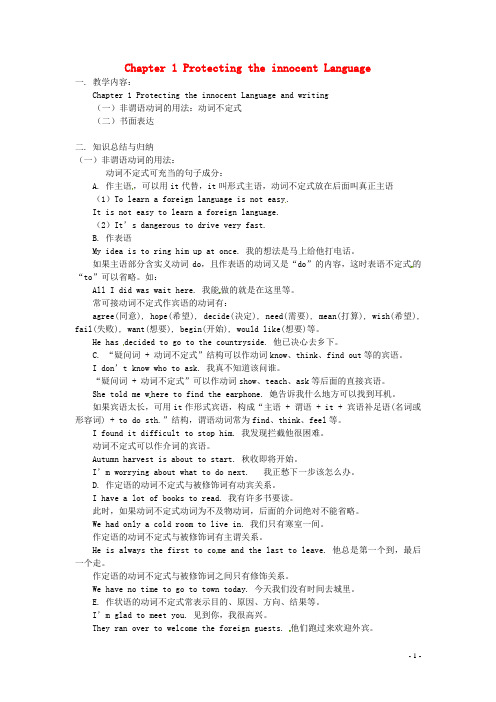
Chapter 1 Protecting the innocent Language一. 教学内容:Chapter 1 Protecting the innocent Language and writing(一)非谓语动词的用法:动词不定式(二)书面表达二. 知识总结与归纳(一)非谓语动词的用法:动词不定式可充当的句子成分:A. 作主语,可以用it代替,it叫形式主语,动词不定式放在后面叫真正主语(1)To learn a foreign language is not easy.It is not easy to learn a foreign language.(2)It’s dangerous to drive very fast.B. 作表语My idea is to ring him up at once. 我的想法是马上给他打电话。
如果主语部分含实义动词do,且作表语的动词又是“do”的内容,这时表语不定式的“to”可以省略。
如:All I did was wait here. 我能做的就是在这里等。
常可接动词不定式作宾语的动词有:agree(同意), hope(希望), decide(决定), need(需要), mean(打算), wish(希望), fail(失败), want(想要), begin(开始), would like(想要)等。
He has decided to go to the countryside. 他已决心去乡下。
C. “疑问词 + 动词不定式”结构可以作动词know、think、find out等的宾语。
I don’t know who to ask. 我真不知道该问谁。
“疑问词 + 动词不定式”可以作动词show、teach、ask等后面的直接宾语。
She told me w here to find the earphone. 她告诉我什么地方可以找到耳机。
9A M3U6 Protecting the innocent
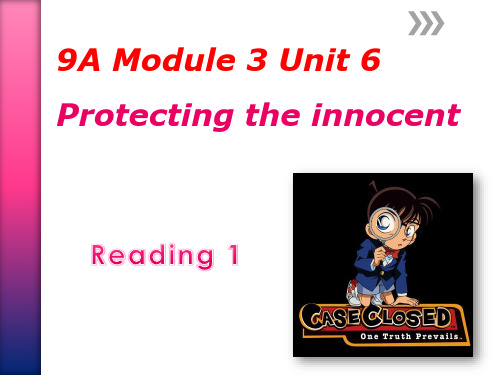
Because he can’t find Lo. 3 What’s wrong with Lo?
He has a broken arm. 4 Does the man know what Hi has said?
No, he doesn’t.
We should be honest, friendly and helpful… in our daily life.
helicopter
speedboat zebra
crossing
roller skates
TV aerial
mobile phone doubledecker bus underground station electric street light
Walkman
Look at the pictures. What are these cases
___J__il_l _a_n_d__J_e_n_n_y__.
Jill probably stole the vase because she had the same necklace.
2A. __b_la_c_k__p_e_a_r_l _e_a_r_r_ing
was found near the
»Who did the case involve(牵 涉)?
It involved Jill, Jenny and Mr. Jones.
»How much do you know about Mr. Jones?
How much do you know about Mr. Jones?
live alone
Chapter1《Protecting the innocent》课件1(9页)(牛津
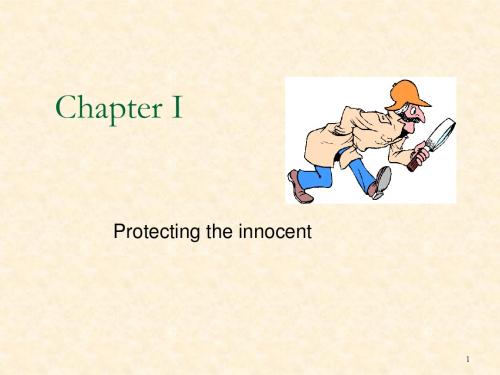
Andrew: How do you know so much about him if you don't know him?
Sidney: If you look closely, you'll see that he’s wearing his watch on his right wrist. Right-handed people like you and me usually wear our watches on our left wrist, so this shows that he's left-handed. Andrew: I see. What about the violin?
Andrew: All right. But how do you know how he came here?
Sidney: Why, he still has the bus pass (公车票)in his left hand!
Andrew: Wow, you're a regular Sherlock Holmes, aren't you?
remember these new words and prepare the dictation. Finish Exercise D on P4.
9
Sidney: Don't mind if I say so myself
3
Answer the questions
Where are Sidney and Andrew? Do they know the man in red? The man isn’t right-handed, is he? We right-handed people usually wear our
九年级英语上册 Chapter 1 Protecting the innocent Language
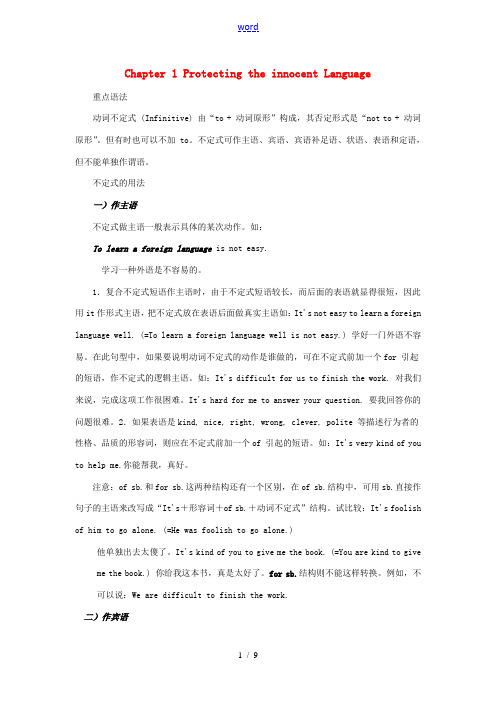
Chapter 1 Protecting the innocent Language 重点语法动词不定式 (Infinitive) 由“to + 动词原形”构成,其否定形式是“not to + 动词原形”。
但有时也可以不加 to。
不定式可作主语、宾语、宾语补足语、状语、表语和定语,但不能单独作谓语。
不定式的用法一)作主语不定式做主语一般表示具体的某次动作。
如:To learn a foreign language is not easy.学习一种外语是不容易的。
1.复合不定式短语作主语时,由于不定式短语较长,而后面的表语就显得很短,因此用it作形式主语,把不定式放在表语后面做真实主语如:It's not easy to learn a foreign language well. (=To learn a foreign language well is not easy.) 学好一门外语不容易。
在此句型中,如果要说明动词不定式的动作是谁做的,可在不定式前加一个for 引起的短语,作不定式的逻辑主语。
如:It's difficult for us to finish the work. 对我们来说,完成这项工作很困难。
It's hard for me to answer your question. 要我回答你的问题很难。
2.如果表语是kind, nice, right, wrong, clever, polite 等描述行为者的性格、品质的形容词,则应在不定式前加一个of 引起的短语。
如:It's very kind of you to help me.你能帮我,真好。
注意:of sb.和for sb.这两种结构还有一个区别,在of sb.结构中,可用sb.直接作句子的主语来改写成“It's+形容词+of sb.+动词不定式”结构。
试比较:It's foolish of him to go alone. (=He was foolish to go alone.)他单独出去太傻了。
Chapter 1 Protecting the innocent教案
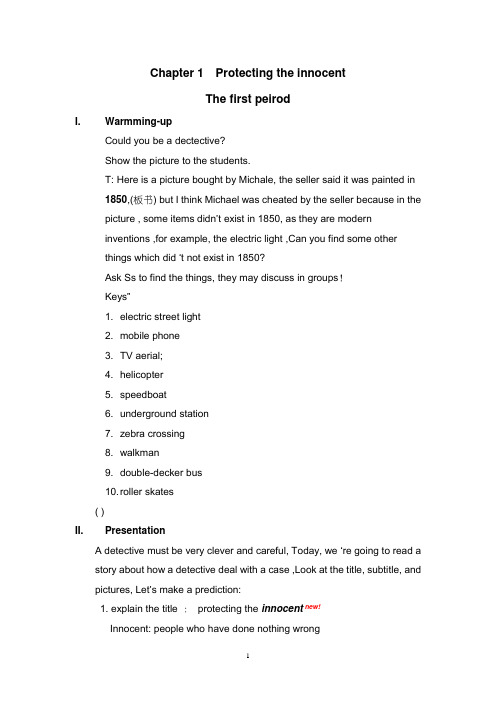
Chapter 1 Protecting the innocentThe first peirodI. Warmming-upCould you be a dectective?Show the picture to the students.T: Here is a picture bought by Michale, the seller said it was painted in1850,(板书) but I think Michael was cheated by the seller because in the picture , some items didn’t exist in 1850, as they are moderninventions ,for example, the electric light ,Can you find some otherthings which did ‘t not exist in 1850?Ask Ss to find the things, they may discuss in groups!Keys”1. electric street light2. mobile phone3. TV aerial;4. helicopter5. speedboat6. underground station7. zebra crossing8. walkman9. double-decker bus10. roller skates( )II. PresentationA detective must be very clever and careful, Today, we ‘re going to read astory about how a detective deal with a case ,Look at the title, subtitle, and pictures, Let’s make a prediction:1. explain the title :protecting the innocent new!Innocent: people who have done nothing wrongPrediction :“T”or “ F”1. The story may be about a case new! (案件) of a stolen diamond. ( ) F2. Someone who didn’t steal anything may thought to be the criminal (罪犯). ( ) T3. Detective Ken may solve the case. ( )T4. The innocent was caught at last. ( )FIII. Reading for gist1. Ask Ss to read quickly, and try to find the following informationWhen? One nightWhere? at Mr.Li’s houseWho? (how many persons are there in the story?)detective Ken, Mr. Li, Jill and Jenneywhat happened? (Ask Ss to offer their own answer)Mr. Li’s vase was stolen and detective Ken found who was the criminal at last.IV. Reading for detailsT:In fact , it is not easy for Doctor Ken to find the criminal, he need to draw some conclusions from some facts he discovered.(show the Ss facts,ask them to find the facts from the textand then the possible conclusions, ask them to match)facts1. Li showed his vase to only two of his friends. (C)2. The ground outside was muddy new!, but the carpet was clean. (a )3. The earring new! near the safe new! belonged to Jill. (d)4. Li bought insurance new! for the vase. (e)5. Li put Jill’s earring near the safe. (b)possible conclusions:a.The thief came from inside Li’s house.b.He wanted the police to believe that Jill had stolen the vase.c.One of them stole itd.Jill stole the vase.e.T: but you know ,a good detective never jumps to conculsions new!,he must find the truth, here are some steps Ken did. read carefully ,and put them in correct order, use” first—next—then—after that---finally(then)____I checked Jill’ story about someone stealing her earrings. (next) ____I interviewed Li’s friends Jill and Jenny.(finally)___I discovered that Li was guilty, and he was put into jail.new!(替换) (first)____ I looked for clues and found an earring.(After that )____ I checked and found that Li had bought insurance for the vase.T:From the truth ,we know which conclusions are wrong?---c, d .V.Words and expressions:1)teach the new words: (CB)the innocentcasemuddyearringthe safeinsurancejump into conclusionsbehind bars2) Show some other words ,ask Ss to find their meaningsclues (p2)dealt with (p2)purchase (p2)pearl (p4)spotlessly (P4)necklace (p6)denied (p6)admit (p8)proof (p8)suspect (p9)the guilty (p14)VI. Homework:1. CB(new words+ 选抄单词A), FDB2. find the meaning of some new words,on note book.3. read the text at least 5 times , 备忘录证明。
初中英语备课参考 Protecting the innocent
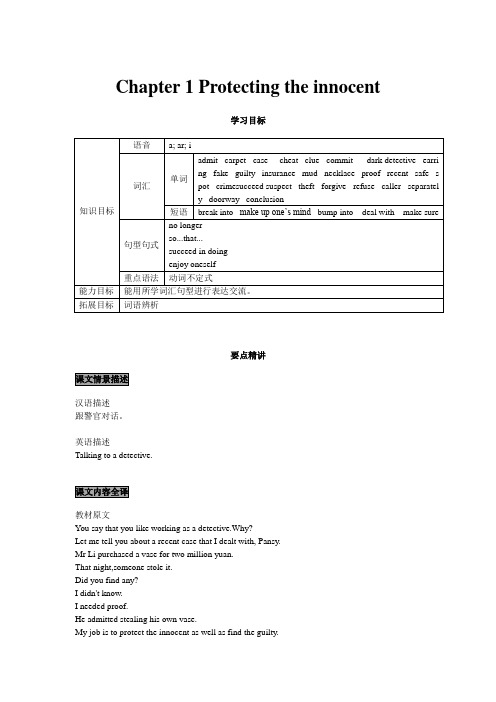
Chapter 1 Protecting the innocent学习目标要点精讲汉语描述跟警官对话。
英语描述Talking to a detective.教材原文You say that you like working as a detective.Why?Let me tell you about a recent case that I dealt with, Pansy. Mr Li purchased a vase for two million yuan.That night,someone stole it.Did you find any?I didn't know.I needed proof.He admitted stealing his own vase.My job is to protect the innocent as well as find the guilty.That's why I like working as a detective.汉语翻译你说你喜欢做侦探,为什么呢?我来和你谈谈最近的接收的一件案子吧!李先生花了两百万买了一个花瓶。
那晚小偷偷走了他的花瓶。
你们有什么发现吗?我还不能确定。
我需要证据。
他承认自己偷了自己的花瓶。
我的工作就是保护无辜者,找到真凶。
这就是为什么我喜欢自己侦探的工作。
词汇1.break into突然闯入make up one’s mind下决心2.alone 单独地Mr. Smith lives alone in the country.alone与lonely的区别He is alone in a lonely house, but he never feels lonely.3.deal with=do with处理Would you tell me how to deal with these old newspapers?Would you tell me what to do with these old newspapers?4.purchase sth. for some money花钱买东西pay/spend5.instead of=in place of代替He goes to school by bus instead of on foot.We advice discussion in place of argument.take the place ofPaper bags have been taken place of the plastic bags.6. theft n. 偷盗thief n. 小偷That night, someone stole the vase. Soon after Lee reported the theft, the police caught the thief at the bus stop.7. spot n. 斑点spotless adj. 极清洁的spotlessly adv. 一尘不染地She is wearing a white skirt with red spot.He keeps his house spotless.Inside the room, the carpet was spotlessly clean.8. jump to conclusions 匆忙下结论A good detective never jumps to conclusions.= A good detective never makes up his mind too quickly.9. make sureHe tried to make sure that Jill would go to jail instead of him.10. the innocent 无辜者the guilty 罪犯the old the poorMy job is to protect the innocent as well as find the guilty.11.take, bring, carry 的区别:take:拿去,拿走以说话人为中心的“去” 例句:Who took the papers on the tables? 谁拿走了台上的报纸?(take –took – taken)bring:带来,以说话人为中心的“来”例句:Bring me the book, please. 请把书带给我。
九年级英语上册 Chapter 1 Protecting the innocent Language
Chapter 1 Protecting the innocentLanguage and writing单选填空:1. I was ______ work last week, but I changed my mind.a. to startb. to have startedc. to be startingd. to have been starting2. I intended ______ the matter with you, but I had some guests hen.a. discussb. discussingc. having discussedd. to have discussed3. Don’t let me catch you ______.a. do that againb. to do that againc. doing that againd. done that again4. There are many kinds of metals ______.a. each has its special propertiesb. one has its special propertiesc. each having its special propertiesd. having its special properties5. It’s pay-day, and they’re waiting ______.a. for payingb. to be paidc. to be payingd. to have paid6. _______ trouble, I’m going to forget the whole affair.a. Then rather causeb. Rather causingc. Rather than caused. Rather than caused7. The brilliance of his satires was ______ make even his victims laugh.a. so as tob. such as toc. so thatd. such that8. Children with parents whose guidance is firm, consistent, and rational are inclined ______ high levels of self-confidence.a. possessb. have possessedc. to possessd. possessing9. The worker is ______ in repairing the machine to notice my coming.a. too busyb. enough busyc. busy tood. busy enough10. “What did you do in the garden?”“I watched my father ______ his motorbike.”a. to repairb. repairedc. repairingd. repairs11. We must have an engineer ______ the workers build the house.a. to seeb. seec. seeingd. seen12. Induction means ______ a general conclusion from special facts.a. to come tob. to comingc. coming tod. came13. I’m not going to ask the teacher why he gave me that grade; I intend _______.a. to let rest the matterb. the matter to be let restin gc. letting the matter to restd. to let the matter rest14. I have tried _______ worrying about it.a. to stop consciouslyb. to consciously stopc. to conscious stoppingd. to stopping consciously15. “Do you want to give a talk on that subject?”“I prefer ______ .”a. not wantb. not wantingc. to not givingd. not to16. I _______ the truth of your remarks, although they go against my interests.a. cannot but admitb. cannot help but to admitc. cannot but admittingd. cannot help but admitting17. Since s he is angry, we ______.a. had better leaving her aloneb. should leave her alonec. might as well leave her aloned. had rather leave her alone18. I don’t allow ______ in my office and I don’t allow my family ______ at all.a. to smoke…smokingb. smoking…to smokec. to smoke…to smoked. smoking…smoking19. You should remember ______ from the point when you are writing a composition.a. don’t wanderb. not to wanderc. no wanderingd. not wander20. Grace advised us to withdraw ______.a. so as to get not involvedb. so as not to get involvedc. so that to get not involvedd. as not to get involved21. He ran all the way up to the station ______ that the train had left fifteen minutes before.a. in order to findb. so as to findc. only to findd. such as to find22. George went hunting for a week but still he di dn’t find a room ______.a. to liveb. to live inc. for livingd. to be living in23. You should really avoid ______ at home alone as he is old and ill.a. your father stayb. your father to stayc. your father’s stayingd. your father who stays24. John didn’t want to risk ______ wet as he had only one suit.a. gettingb. to getc. being gotd. to be gotten25. I’m disappointed with the new officers elected in our club, but there is no point _______ about it.a. to worryb. in worryingc. with us worryingd. if we worry26. It won’t be any use ______ to borrow any more money.a. you to tryb. of your tryingc. trying youd. your trying27. The law requires all cars _______ for safety and efficiency.a. being tested regularlyb. to be regularly testedc. be regularly testedd. regularly tested28. I remember ______ to the zoo by my father when I was little.a. being takenb. takingc. have been takend. to have taken29. I completely forgot ______ the front door last night and feel fortunate that nothing is stolen.a. lockingb. being lockedc. to lockd. to have locked30. I regret ______ you that your application has been refused.a. informingb. being informedc. to be informedd. to inform31. I didn’t mean ______ anything, bu t these apples looked so good I couldn’t resist ______ one.a. to eat…tryingb. to eat…to tryingc. eating…to tryd. eating…to trying32. I know it isn’t important but I can’t help ______ about it.a. but to thinkb. thinkingc. thinkd. to think33. The ship, ______ to a shapeless wreck, was hardly recognizable.a. being reducedb. reducingc. reducedd. having been reducing34. The young doctor could not sleep at night, his thoughts ______ him no peace.a. gaveb. givingc. being givend. to give35. After a long walk on a hot day, one feels ______.a. exhaustiveb. exhaustingc. exhaustd. exhausted36. Those relatives of his are ______ . I don’t want to have any dealings with them.a. boring peopleb. bored peoplec. people hav ing boredd. people having boring37. You must follow the dir ections exactly and if you become ______, you must take the time to go back again and reread them.a. to confuseb. confusingc. confused. confused38. There is something wrong with my TV set, I must have it ______.a. checkingb. checkc. to checkd. checked39. He was just about to jump up when he felt something ______ near his feet.a. to moveb. movec. movingd. moved40. ______ with the corresponding period of last year, the output of chemical fibers in the first quarter rose by 15%.a. Comparingb. To comparec. Comparedd. Compare41. “Was the rally successful?’“No, because the number of ______ was smaller than we had expected.”a. people who attendb. attended peoplec. people attendingd. attendance of people42. Uncle Dick has already arrive. Do you expect ______ to see him?a. goingb. goc. to god. that you go43. From the electric refrigerator Dick takes a carton of cream, another of fresh milk and a can of ______ orange juice.a. frozenb. frozec. freezingd. freezed44. He felt bad for ______ a chance to study abroad.a. having not givenb. not having givenc. having not been givend. not having been given45. In some countries there are already a number of firms ______ computer programming.a. specialize inb. specialized inc. specializing ind. specializes in46. The young man who saw the car ______ into the river telephoned the police station.a. plungeb. plungedc. w as plungingd. to plunge47. While she was shopping, she kept ______ the list to make sure she hadn’t forgotten anything.a. checkedb. checkingc. to checkd. check48. You’d better ______.a. to have your shoes mendedb. to have mended your shoesc. have your shoes mendedd. having your shoes mended49. The machines are made ______ at full speed.a. workb. workingc. to workd. to be worked50. It is certain that men will never stop ______ new energy sources to power their growing industry.a. findingb. to findc. having foundd. found【试题答案】1. b2. d3. c4.c 5. b 6. c7. b 8. c 9. a 10.c 11. b 12. c13. d 14. b 15. d 16. b 17.d 18. d19. b 20. b 21. c 22.b 23.c 24. a25. b 26. d 27. b 28.a 29. c 30. d31. a 32. b 33. c 34.b 35. d 36. a37. d 38. d 39. c 40.c 41. c 42. c43. a 44. d 45. c 46.a 47.b 48. c49. c 50. a。
牛津上海版英语九上Chapter1Protectingtheinnocentword教案
Chapter 1 Protecting the innocentOverview:This chapter is about detectives and crimes. The main passage is an interview between Pansy and Detective Ken, who tells her about one of his cases.The Listening section contains a task about identifying stolen jewellery, in which students have to listen to a spoken description and identify the correct pictures. The Language section contains several exercises featuring Detective Ken. The main task in the Speaking section is a role-play game in which two robbery suspects must try to give the same story during separate interviews. In the Writing section, students must use pictures and notes to write a report of a crime.Pre-chapter activitiesstudents what crimes have been reported in the news recently. Tell them to watch that night's news and to make a list of the crimes mentioned.activate and improve vocabulary associated with crime and de tection, ask students to do the following match.1) robbery a something put on criminals2) murder b something that helps you find the answer3) stealing c having committed a crime4) clue d tak ing what is not yours from someone5) suspect e the person who makes the decision in court6) innocent f taking somet hing is not yours7) guilty g what people tells the police8) witness h having done nothing wrong9) statement I killing someone10) judge j someone who saw what happened11) handcuffs k someone the police think committed a crimeReadingA What do you know about…?Read the short dialogue with the class and ask them to find the clues in the picture that tell them it must have been painted recently. All of the answers are particular historical period. The ten items did not exist in 1850, as they are all modern inventions.B Look and thinkstudents to examine the title, introduction and picture in order to create expectations about what they are going to read.them to tell you as much as they can. For instance, from the title we can guess that an innocent person is in some sort o f danger. The man in the picture is probably rich, as he is wearing a bow tie and putting an expensive-looking vase into a safe. The vase may likely be stolen. The two women could be the suspects.C Find the factsStudents should keep these questions in mind as they read the text. Having a purpose in reading can assist in understanding.Reading passageV ocabularythe new words.some exercises about the words.D Find the meaningsstudents to find the words in Exercise D1 in the passage, and then to think about what they might mean. Students should work alone to complete the exercise.students to do Exercise D2. Let them follow the same process as with Ex D1 to select the correct words to fill in blanksText “Protecting the innocent“This is an interview between Pansy and Detective Ken.to the tape twice.to tell the statements are true or false.(1) Pansy is a detective. (F)(2) Mr. Li purchased a vase for two million yuan.(T)(3) Mr. Li's two friends stole the vase.(F)(4) Mr. Li stole Jill's earring.(T)(5) Mr. Li stole his own vase.(T)(6) He wanted the insurance company to give him a large sum of money.(T)(7) Ken often jumps to conclusions.(F)the text after the tape.the questions.(1) Why did Pansy interview Detective Ken?(2) Who is Mr. Li?(3) What does Mr. Li enjoy?(4) What happened after Li show it to his friends?(5) Did Jill and Jenny admit stealing the vase?(6) What does the mud outside and the spotless carpet carpet inside mean?the text.E Read and thinkexercises help to develop logical thinking. Before doing the exercise, use the following material to prepare students.students that by jumping to a conclusion they might from a very wrong idea about something. Ask them to think of a few different possible reasons to explain the sta tements below in order to demonstrate how easily one can make the wrong judgement.students to think of similar sentences and to see what possible different con clusions their classmates can make.students to d Exercise E1, E2 and E3 on their own.them to complete E4 working in pairs. Itlogical sequencing and the use of cohesive ties, such as finally, next, etc.ListeningIdentifying objects from a descriptionthat the police have found the jewellery in the picture. Make sure students kn ow the words bracelet, ring, necklace and earring, and also the words gold and silver and the precious stones listed below. They should also know the useful phrase in the shape of.the recording once or twice, while students identify the five pieces of jewellery.the Li stening task, you can use this picture for an oral exercise. One student must describe one piece from the picture, and others must identify the right one.本章的听力要求学生通过对事物的描述识别不同的事物。
牛津上海版英语九上Chapter1Protectingtheinnocentword教案
Chapter 1 Protecting the innocentOverview:This chapter is about detectives and crimes. The main passage is an interview between Pansy and Detective Ken, who tells her about one of his cases.The Listening section contains a task about identifying stolen jewellery, in which students have to listen to a spoken description and identify the correct pictures. The Language section contains several exercises featuring Detective Ken. The main task in the Speaking section is a role-play game in which two robbery suspects must try to give the same story during separate interviews. In the Writing section, students must use pictures and notes to write a report of a crime.Pre-chapter activities1.Ask students what crimes have been reported in the news recently. Tell them to watch that night's news and to make a list of the crimes mentioned.2.To activate and improve vocabulary associated with crime and de tection, ask students to do the following match.1) robbery a something put on criminals2) murder b something that helps you find the answer3) stealing c having committed a crime4) clue d tak ing what is not yours from someone5) suspect e the person who makes the decision in court6) innocent f taking somet hing is not yours7) guilty g what people tells the police8) witness h having done nothing wrong9) statement I killing someone10) judge j someone who saw what happened11) handcuffs k someone the police think committed a crimeReadingA What do you know about…?Read the short dialogue with the class and ask them to find the clues in the picture that tell them it must have been painted recently. All of the answers are particular historical period. The ten items did not exist in 1850, as they are all modern inventions.B Look and think1.Ask students to examine the title, introduction and picture in order to create expectations about what they are going to read.2.Encourage them to tell you as much as they can. For instance, from the title we can guess that an innocent person is in some sort o f danger. The man in the picture is probably rich, as he is wearing a bow tie and putting an expensive-looking vase into a safe. The vase may likely be stolen. The two women could be the suspects.C Find the factsStudents should keep these questions in mind as they read the text. Having a purpose in reading can assist in understanding.Reading passageV ocabulary1.Learn the new words.2.Do some exercises about the words.D Find the meanings1.Ask students to find the words in Exercise D1 in the passage, and then to think about what they might mean. Students should work alone to complete the exercise.2.Tell students to do Exercise D2. Let them follow the same process as with Ex D1 to select the correct words to fill in blanksText “Protecting the innocent“This is an interview between Pansy and Detective Ken.1.Listen to the tape twice.2.Try to tell the statements are true or false.(1) Pansy is a detective. (F)(2) Mr. Li purchased a vase for two million yuan.(T)(3) Mr. Li's two friends stole the vase.(F)(4) Mr. Li stole Jill's earring.(T)(5) Mr. Li stole his own vase.(T)(6) He wanted the insurance company to give him a large sum of money.(T)(7) Ken often jumps to conclusions.(F)3.Read the text after the tape.4.Answer the questions.(1) Why did Pansy interview Detective Ken?(2) Who is Mr. Li?(3) What does Mr. Li enjoy?(4) What happened after Li show it to his friends?(5) Did Jill and Jenny admit stealing the vase?(6) What does the mud outside and the spotless carpet carpet inside mean?5.Analyze the text.E Read and think1.The exercises help to develop logical thinking. Before doing the exercise, use the following material to prepare students.2.Remind students that by jumping to a conclusion they might from a very wrong idea about something. Ask them to think of a few different possible reasons to explain the sta tements below in order to demonstrate how easily one can make the wrong judgement.3.Ask students to think of similar sentences and to see what possible different con clusions their classmates can make.4.Tell students to d Exercise E1, E2 and E3 on their own.5.Ask them to complete E4 working in pairs. It6.practices logical sequencing and the use of cohesive ties, such as finally, next, etc.ListeningIdentifying objects from a description1.Explain that the police have found the jewellery in the picture. Make sure students kn ow the words bracelet, ring, necklace and earring, and also the words gold and silver and the precious stones listed below. They should also know the useful phrase in the shape of.2.Play the recording once or twice, while students identify the five pieces of jewellery.3.After the Li stening task, you can use this picture for an oral exercise. One student must describe one piece from the picture, and others must identify the right one.本章的听力要求学生通过对事物的描述辨认不同的事物。
九年级英语Chapter 1 Protecting the innocent Reading 1 上海牛津版
九年级英语Chapter 1 Protecting the innocent Reading 1 上海牛津版【本讲教育信息】一. 教学内容:Chapter 1 Protecting the innocent Reading 1(一)对课文的阅读理解(二)课文知识点梳理;词汇和词组、语言点二. 本周知识总结与归纳:(一)对课文的阅读理解1、阅读课文,用时5分钟。
2、回答B Look and think 和C Find the facts的问题。
3、再一次通读课文,划出你不认识的生词。
4、回答下面问题(1)What kind of person is Mr. Li?(2)How much did Mr. Li spend on a vase?(3)Where did he put the vase?(4)Who else knew the vase?(5)What happened to the vase?(6)What did Ken find?(7)Who wore a black pearl necklace?(8)What happened to Jill’s earrings?(9)Was there any mud on the carpet inside the room?(10)Who stole the vase? Why?(11)Why does Ken like working as a detective?(二)课文知识点梳理词汇和词组admit carpet case cheat clue commit crime dark detective earring fake guilty insurance mud necklace proof recent safe spot succeedsuspect theft forgive refuse caller separately doorway conclusionbreak into make up one’s mind bump into语言点1、alone 单独地Mr. Smith lives alone in the country.alone与lonely的区别He is alone in a lonely house, but he never feels lonely.2、deal with=do withWould you tell me how to deal with these old newspapers?Would you tell me what to do with these old newspapers?3、purchase sth. for some moneypay/spend4、instead of=in place ofHe goes to school by bus instead of on foot.We advice discussion in place of argument.take the place ofPaper bags have been taken place of the plastic bags.【模拟试题】(答题时间:40分钟)一、词汇(A)用所给单词的适当形式填空1. I like to keep my bedroom clean and __________. (spot)2. Thank you for your __________. (kind)3. __________, I failed in the contest. (lucky)4. Do you live on the __________ floor on the block? (twelve)5. Tim was late, but he couldn’t give any __________. (explain)(B)选择与划线部分意思相近的短语A. right awayB. happened toC. as large asD. take the place ofE. set upF. not politeG. was to be given()6. Computers will never completely replaced humans.()7. Last Sunday, I chanced to meet my old friend.()8. It’s rude to point to others when you speak.()9. The government decided to build a modern hospital there.()10. Is your school the same size as theirs?()11. Let’s set out immediately so that we can get there in time.(C)从方框内找到与括号内的词意思相近的词,并将其写在横线上。
- 1、下载文档前请自行甄别文档内容的完整性,平台不提供额外的编辑、内容补充、找答案等附加服务。
- 2、"仅部分预览"的文档,不可在线预览部分如存在完整性等问题,可反馈申请退款(可完整预览的文档不适用该条件!)。
- 3、如文档侵犯您的权益,请联系客服反馈,我们会尽快为您处理(人工客服工作时间:9:00-18:30)。
The school to be built is intended for the disabled children. 即将要建的学校是为残疾儿童而设的。 The school being built is intended for the disabled children. 正在建设的学校是为残疾儿童而设的。 The school built last year is intended for the disabled children. 去年建的学校是为残疾儿童而设的。 The school, having been built for two years,is intended for the disabled children. 建设花了两年多的学校是为残 疾儿童而设的。
It is fun talking with a foreign teacher. 跟外教谈话真有趣。 3、不定式作主语的被动语态句子,必须用形式主语结构。如 It was decided to set up a new football club in our school. 已经决定 在我们学校建立一个足球俱乐部。 4、在口语中,用动名词作主语置于句首的情况要比不定式多。 5、疑问句中,一般多用动名词的复合结构作主语,而不用不定式 复合结构。如: Does our helping mean a lot to all of you? 我们提供帮助对你们很重 要吗? 6、在句型“There be no+主语”中,习惯上常用动名词作主语, 且不带逻辑主语。如 There is no parking around here. 这周围不准停车。
(4)mean: mean to do sth. 想做;mean doing sth.意味着。如 :
Wasting time means killing life. 浪费时光就意味着浪费生命。 Revolution means liberating the productive forces. 革命意味着 解放生产力。 (5)forget: forget doing/ having done/to have done sth.. 忘了 已做过的事;forget to do sth.忘记将要做的事。如: I forgot telling him about the news. 我忘了曾把那件事告诉过他 。 Don’t forget to wake me up at 6 tomorrow morning. 别忘了明 天早晨6点叫醒我。 (6)go on: go on doing sth.继续干未干完的事(强调动作的持 续);go on to do sth.继续干是一件事(强调事情的转接)
Seeing is believing. 眼见为实。 To see is to believe.
三、不定式、分词和动名词作表语的区别
1、表示一般的概念时,不定式动名词可以互换。如:
What she likes is watching (to watch) children play. 我最的就是看 孩子玩耍。 2、表示具体的个别的动作或有将来含义时,一般用不定式, 无抽象 概念一般用动名词。如: My wish is to become a famous pianist. 我的愿望就是成为一名著 名的钢琴家。
There is no telling what will happen. (=It is impossible to tell what will happen.) 无法知道会发生什么。
7、不定式、动名词作主语时可有自己的逻辑主语。不定式的逻辑 主语通常是介词for/of引导的名词或宾语代词;动名词的逻辑主语 则常用名词所有格或形容词性物主代词。如:
Chapter 1 Protecting the innocent
Language
一、非谓语动词用法比较详析
主动语态
make 一般式 进行式 不定 式 to make to be making 完成 式 to have made
被动语态
一般 式
句法功能
完成式 主 宾 表 定 状 补
to have to be been √ √ √ √ √ √ made made √ √ √ √ having been made √ √ √ √ √ √ √ √
The shop is closed. 商店关门了。 (分词) The door was closed by the wind. 门被风吹上了。 (被动) 6、动名词和现在分词作表语与进行时态形式相同。动名词作表语 说明主语的内容;现在分词作表语说明主语的性质、特征,而现在 进行时态说明正在进行的动作。现在分词被动语态不作表语。如: My job is teaching young children to climb mountains. 我的 工作就是教孩子如何爬山。 (动名词)
现在 分词
动名 词 过去 分词
making
havin being g made m被动形式有和过去分词在 意义表达相交叉的区域,因此认真区分它们在这方面的用法对于准 确理解和表达英语是很有帮助的。 如:to be done, being done, done, having been done都可表示被动, 同时都可作定语,但它们在作定语时,是有明显区别的。如:
I like reading/to read China Daily. 我喜欢读中国日 报。 Let’s continue playing/to play the game. 咱们继续 玩游戏吧 3、跟不定式和动词的-ing形式皆可,但意义相差很 大的动词 try, regret, forget, 这类动词常用的有: remember, can’t help, mean, go on等。如: (1)try: try to do sth.尽力做难做的事;try doing sth.试着做某一件可能会出现某一结果的 事。
3、动名词作表语和主语指的是一回事,常可与主语换位,回答 what或doing what的问题。现在分词作表语,表示主语的性质和特 征,回答how的问题,其主语可以是具体的人或物。如:
Their job is to finish the experiment by the end of this week. 他们 本周的工作就是完成这个实验。 The story is very exciting. 这个故事很令人激动。 4、现在分词作表语表示主动概念,过去分词作表语表示被动概念 。如:
二、不定式和动名词作主语的区别
1、动名词多表示一般的、抽象的、泛指的概念或一个已经完成了 的动作,强调的是事情本身。而不定式则表示具体的第一次行为或 将来的动作,强调的是动作本身,不过有时二者之间区别很小。如: Reading English novels is really great fun. 读英语小说真有趣。 To read English novels this evening will take most of my time. 今晚 读英语小说会花去我很多时间。 2、动词不定式作主语时,常用形式主语结构,而动名词作语时较 少使用形式主语,只有在It is no good/no use/useless/fun/intresting/hard/difficult等句型中常用it作形式主语。 如: It is hard to make him change his mind. 很难让他改变主意。
He tried to stand up but failed. 他试图站起来,但没成功。 Let’s try telling him about the sad news. 咱们试着把这个不幸的 消息告诉他。
(2)regret: regret to do sth. 对马上要做的事表示遗憾;regret doing sth.对已发生的事表示遗憾或后悔。 I really regret missing/having missed his lecture. 我没能听他 的讲座真感到遗憾。 I regret to tell you that I cannot come. 真遗憾,告诉你我不能来 了。 (3)can’t help: can’t help doing sth.禁不住;can’t help (to) do sth. 不能帮忙干… I couldn’t help shaking with so few clothes on. 穿这么少的衣服 我禁不住打起哆嗦。 I can’t help to clean the place up.我不能帮助打扫这里了。
They were deeply moved to hear the old man’s story. 听到老 人的故事,他们被深深地打动了。 What he said isn’t interesting at all. 他的讲话一点也没有趣。 5、过去分词作表语,强调状态,分词前可以加very等程度副词, 后面一般不用by引起的短语,时态概念不强。而被动语态表示动作 ,时态概念较强。如:
Lincoln said that it was not right for the South to break away from the Union. 林肯说南方脱离联邦是不对的。 The students’ knowing English well helped them in learning French. 对英语了解很好的人学习法语会有很大帮助。 8、当表语是动名词时, 主语要用动名词,当表语是不定式时,主语 也要用不定式。如:
The old man went on doing his work after a short rest. 那位老人稍作休息便 又干起手中的活。 The old man went on to play another song. 这个老人接着弹奏另一首曲子。
(7)remember: remember doing/having done/ to have done sth. 指记着做 过的事;remember to do sth.记着要做事。如: Please remember to come on time. 请记着按时来。 I still remember being taken to the Science Museum for the first time. 我仍 记得第一次被带到博物馆的情景。 (8)stop: stop to do sth. 停下正在做的动作去做另一动作;stop doing停止 做动名词所表示的动作。如:
